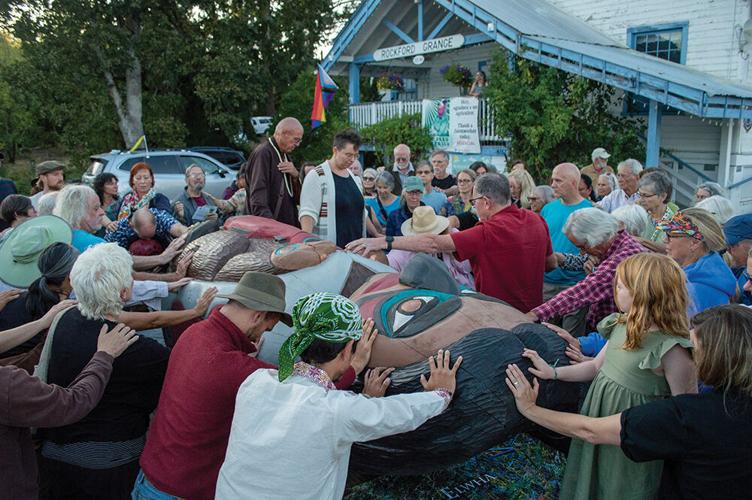By Nathan Wilson
Columbia Gorge News
HOOD RIVER — With President Donald Trump and Agriculture Secretary Brooke Rollins moving to rescind the roadless rule, more than 100 people gathered at the Rockford Grange last Monday to submit comments in opposition and celebrate a totem pole specially carved for the cause.
Enacted in 2001, the Roadless Area Conservation Rule still protects about 45 million acres of largely untouched, federally-owned forests from road-building and logging nationwide, including about 2 million acres each in Oregon and Washington, along with parts of the National Scenic Area. Rollins made the announcement, which paralleled Trump’s executive order to ramp up domestic timber production, on June 23, and the three-week period to issue public comment ended Sept. 19.
To stave off the potential rollback, House of Tears Carvers from the Lummi Nation, known as the “People of the Sea” who are native to Washington’s northernmost coast and southern British Columbia, organized a nine-stop totem pole journey across the Northwest with Se’Si’Le, an Indigenous-led nonprofit.
Called “Xaalh and The Way of the Masks,” one of several campaigns since 2001, the cedar totem depicts a bear transforming into a human, or vice versa, which is an important symbol from the legend “Bear and the Steelhead.”
As the tale goes, Bear is not allowed to hunt or fish while his wife is pregnant because of an agreement made with Salmon Woman, who let her children live in the village waters under certain conditions. Feeling the urge to provide for his wife, though, Bear went fishing one day. As he touched each of the children in their beds, Chinook, Sockeye and so on, all of their siblings downstream died, but it was no matter to Bear. He didn’t touch Steelhead, however, and that’s why, to this day, only Steelhead lives after swimming upriver to spawn.
“We live in a world where we are the pigs of the world. We consume more, waste more than any other people on Earth. Now, what type of example are we to the rest of the world? They need this forest,” said Jewell James, who carved the totem. “You should only take what you need and leave some for the seven generations away. You should leave more for them than you had when you came into this life.”
James explained that the totem pole represents transformation, a reminder that we must learn to love and work together. As he spoke, those listening filled out postcards destined for Washington, D.C., each with a short note on why they believed the roadless rule should remain in place.
“This move opens a new era of consistency and sustainability for our nation’s forests. It is abundantly clear that properly managing our forests preserves them from devastating fires and allows future generations of Americans to enjoy and reap the benefits of this great land,” Rollins said her announcement.
According to a 2020 study by the United States Forest Service (USFS), which Rollins oversees, a lack of roads has not hindered fire prevention efforts — historical fire maps indicate that forests with and without road have burned at similar rates since 2001 — and roads are strongly correlated with the spread of invasive species in national forests. Roadbuilding also increases erosion, affecting water quality and salmon, among other impacts.
While largely a result of the Northwest Forest Plan, total timber harvest in Oregon and Washington has dropped significantly since the late 1980s, particularly in national forests, according to data compiled by USFS. That’s had a severe impact on logging-dependent communities like Skamania County, but James and the Lummi Nation see the roadless rule repeal as an irreversible step backward.
“When the government fails, whether that’s Democrats, Republicans, the House or the Senate, the presidency or the Supreme Court, the last power is the people,” James said. “You have to believe in your constitutional power. That’s your constitution. It’s a living document, so long as you exercise your right to vote.”
Apart from James, several organizations also spoke about their support for the roadless rule, including the nonprofits Save Our Wild Salmon, Friends of the Columbia Gorge and Columbia Riverkeeper.
“These forests offer critical habitat to countless species,” said Abby Dalke, the outreach coordinator for Save Our Wild Salmon. “Forests provide carbon sequestration and canopy cover in the face of a changing climate. Our forests are worth more standing, and we need to make sure they remain intact.”
James asked that everyone persuade at least 10 others to send letters as he wrapped up speaking, then the group went outside to bless the totem pole, led by Bethel’s Pastor Andy Wade, Pastor Miranda Bermes from Spirit of Grace and Thich Minh Tinh with the Mount Adams Buddhist Temple. James also presented Mayor Paul Blackburn with a ceremonial mask.
In order to successfully rescind the roadless rule, USFS must produce two environmental impact statements, the first of which includes another public comment period. The final rule is then subject to congressional review and potential litigation; all told, the process may last well into 2026 or longer.
As for the totem pole journey, James and Se’Si’Le headed to Idaho next before the totem arrived at its final resting place: with the Lower Elwha Klallam Tribe near Port Angeles, Washington.
“Words are easy. It’s hard to commit,” said James. “It’s hard to put words that you speak into real action.”























Commented
Sorry, there are no recent results for popular commented articles.